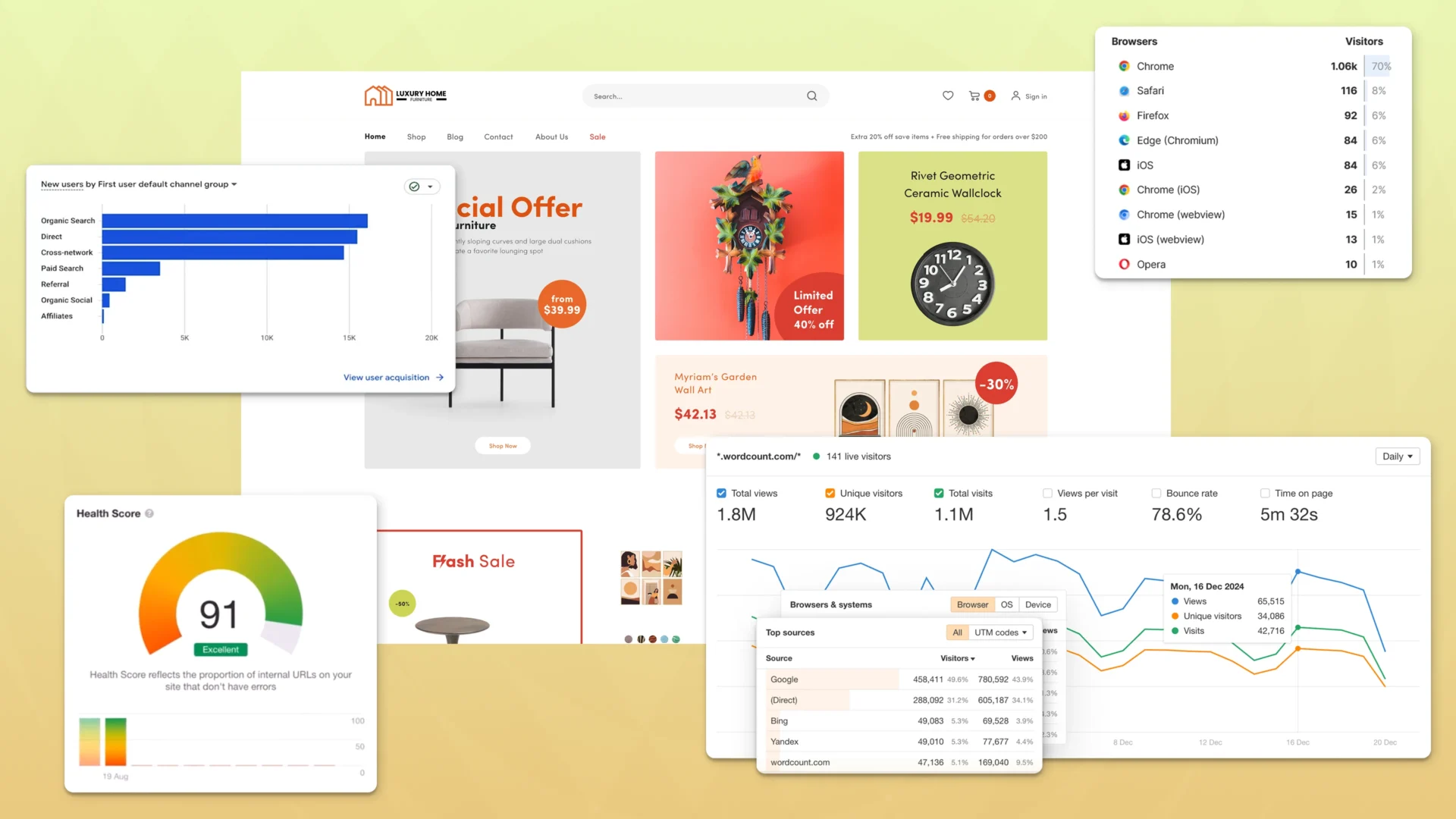
In modern digital business, data decides everything. Without analytics, a company loses control over key processes: marketing, user behavior, sales funnels, and the efficiency of acquisition channels. Numbers reveal which campaigns bring profit, where users get “stuck” in the interface, and which customer segments deliver the most value. For this, companies increasingly use end-to-end website analytics, which combines metrics about traffic, sales, and customer interactions into a single picture.
Many companies by habit use Google Analytics as their main tool for evaluating traffic and user behavior. However, in recent years the question arises more often: is it enough? GA has its limitations – from complex setup to controversial GDPR issues and report latency. For custom solutions and online stores, this may not be sufficient: businesses need flexible reports, control over user scenarios, and transparency in working with data.
In this article, we will look at alternative web analytics systems that are suitable for custom websites and e-commerce platforms. We will compare their functionality, approaches to processing metrics, and cost to help choose the optimal tool for specific business needs.
For website analytics to truly help the business, it is important to consider not only basic traffic collection but also the specific tasks of custom websites and online stores. The key requirements include:
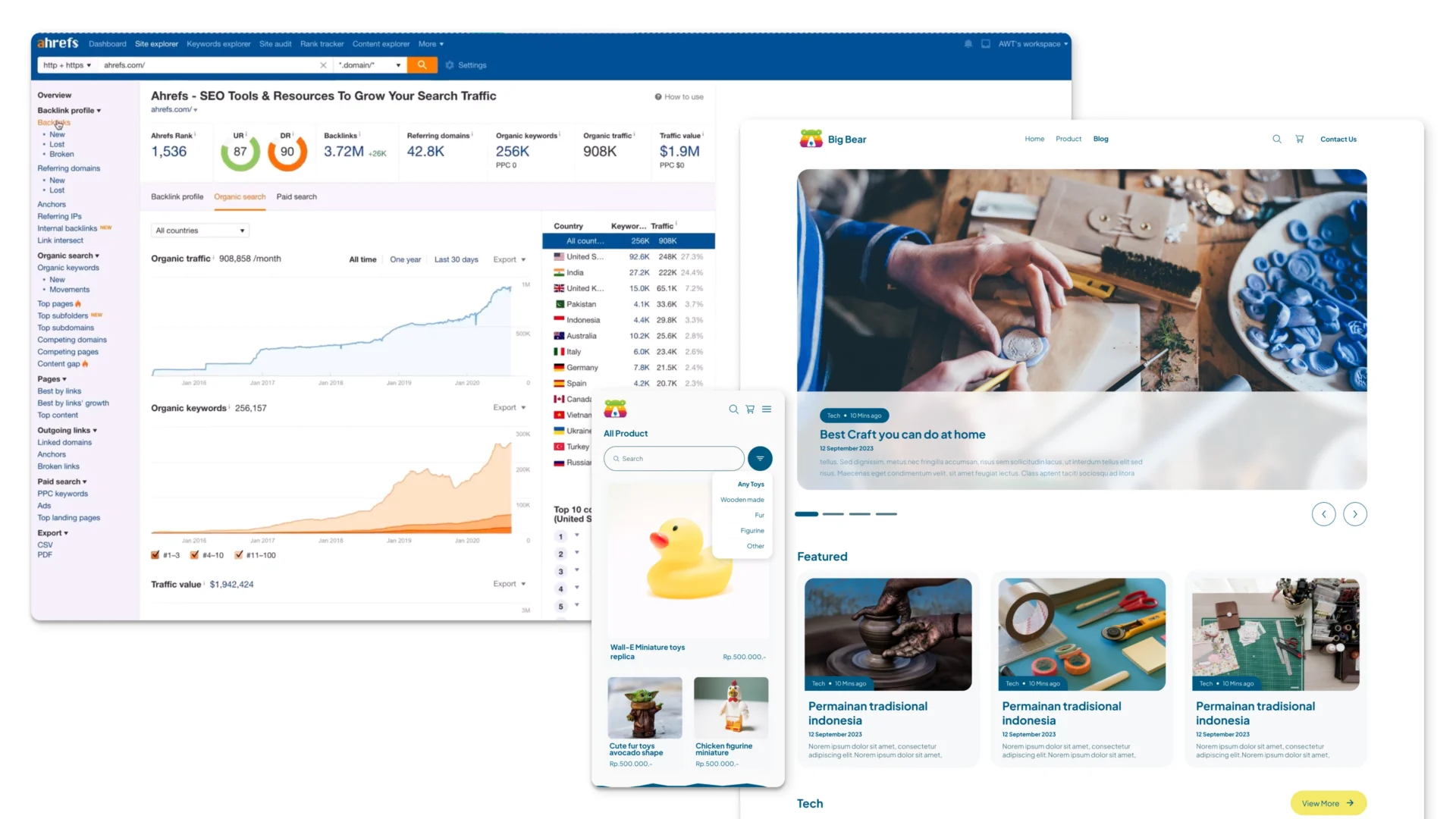
Google Analytics remains the most widespread solution for web analytics, and for many companies it becomes the first entry point. The new GA4 version moved from the classic session-based model to an event-based model, which allows flexible tracking of user actions. However, with the update, the service became significantly more complex to configure and raised questions from businesses, especially related to GDPR and data storage.
To understand the strengths and weaknesses of GA4, let’s look at its key characteristics in a table:
| Characteristic | Description |
| Data model | Event-based model instead of sessions |
| Cross-platform | Tracking web and mobile apps in a single system |
| Integration | Connection with Google Ads, BigQuery, Search Console |
| Data storage | Free plan: up to 2 months by default (up to 14 months with configuration); paid GA360 – more |
| Cost | Free, GA360 – Enterprise custom terms |
| Reporting | Flexible dashboards and event setup, but complex interface |
| Speed | Delays exist, not all in real time |
| Confidentiality | Data stored in the US, possible compliance concerns |
Pros:
Cons:
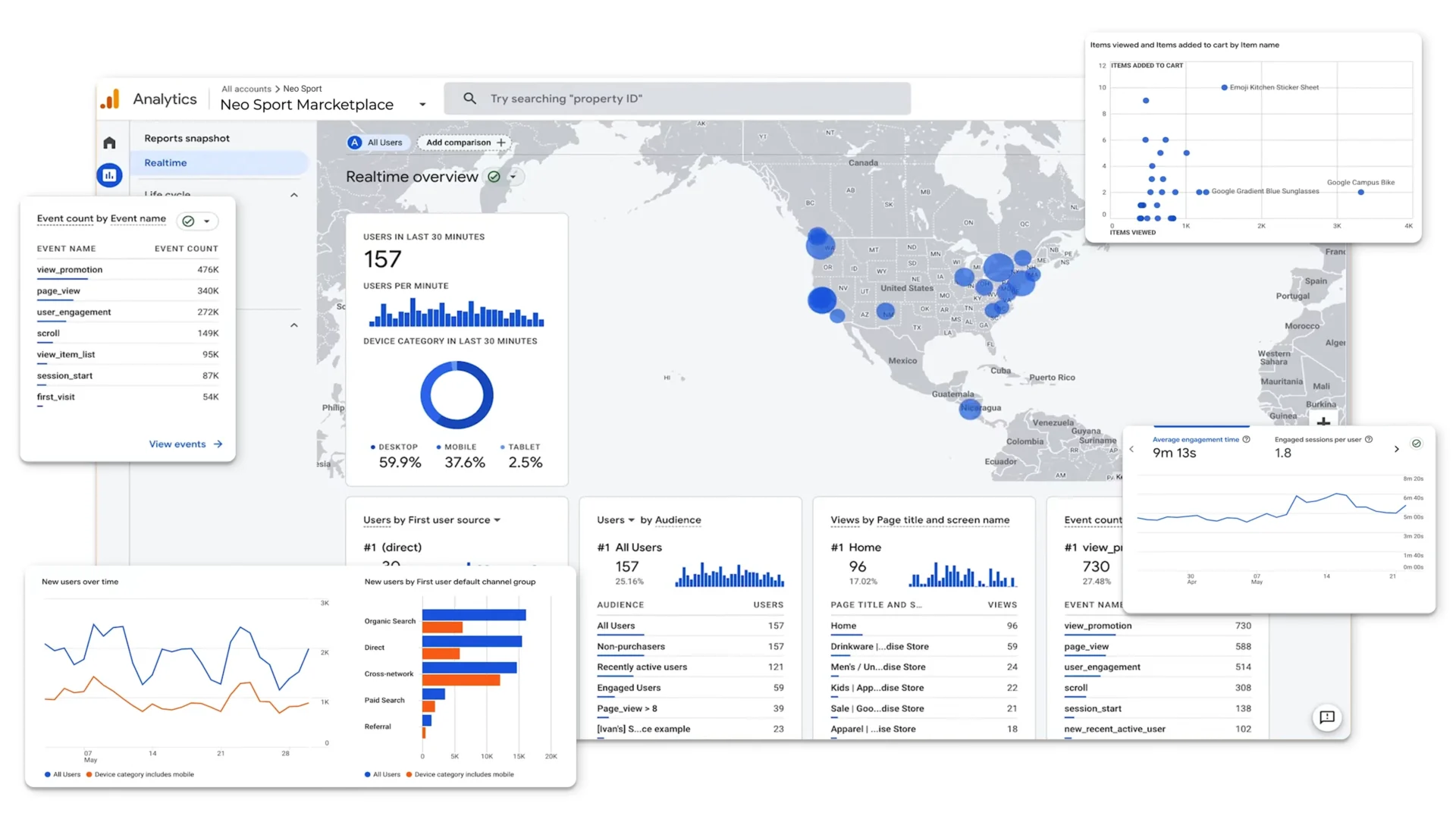
Plausible positions itself as a lightweight and transparent alternative to Google Analytics. The service is built with a strong focus on privacy: it fully complies with GDPR requirements, does not use cookies, and does not collect personal user information. The interface is simplified to the maximum – no dozens of tabs or complex reports – which makes it convenient for marketers and business owners who value fast interpretation of metrics.
Plausible is often used in custom projects and online stores at Avada Media. Earlier, we prepared a detailed blog article about using Plausible as an alternative to GA.
| Characteristic | Description |
| Data model | Simplified event-based model |
| Cross-platform | Websites, custom solutions, support for basic e-commerce events through custom goals |
| Integration | Easy connection to CMS and custom projects, API available |
| Data storage | Data anonymized, stored in the EU. Self-hosted option available |
| Cost | Paid cloud version (from ~$9/month, depending on traffic) and free Community Edition for self-hosted |
| Reporting | Minimalist dashboards with key metrics |
| Speed | Almost real time |
| Privacy | Fully GDPR-compliant, no cookies |
Pros:
Cons:
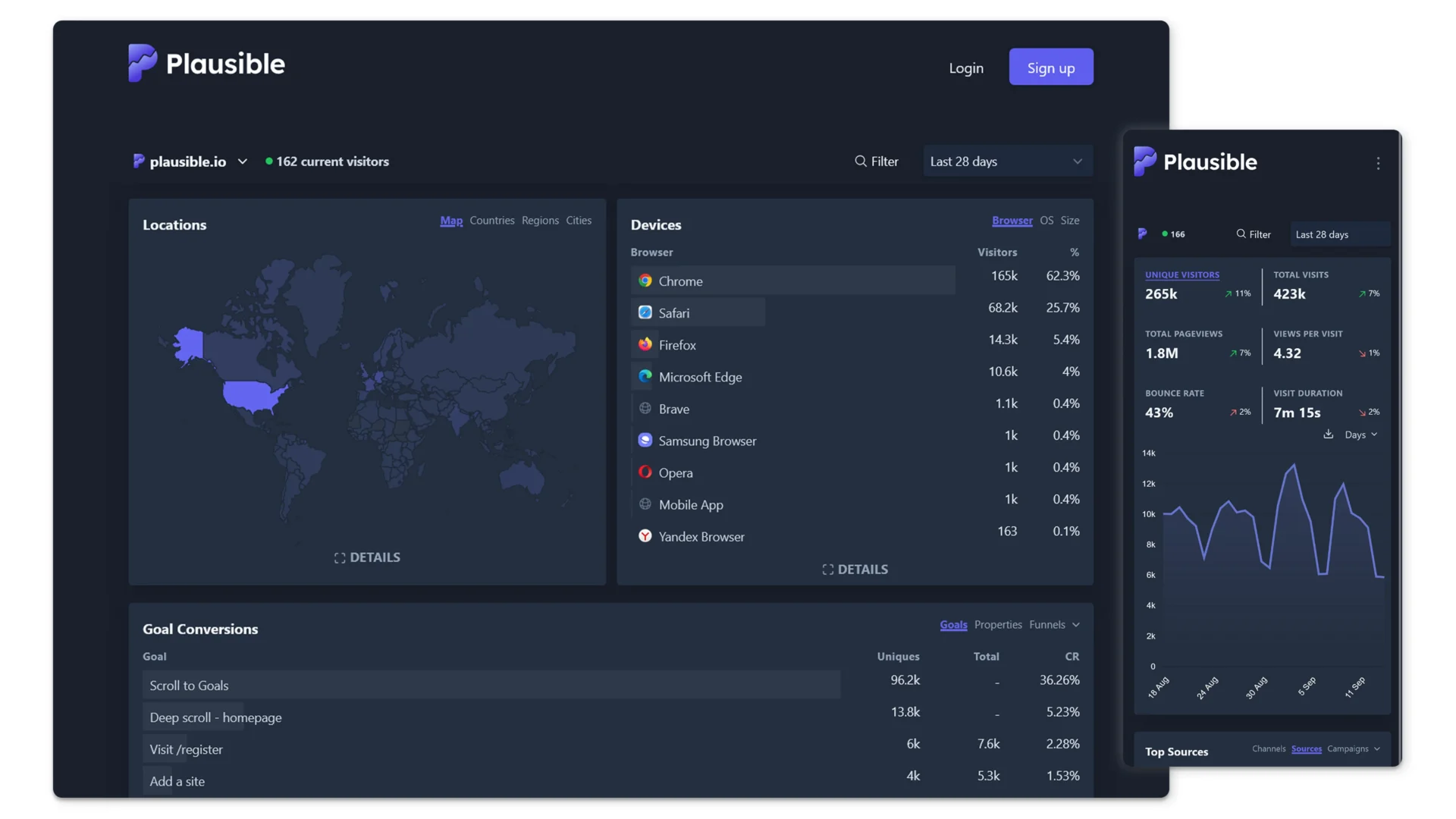
Umami is a lightweight, fully open-source analytics system that can be installed on your own server. Like Plausible, it is privacy-oriented: no cookies, no personal data, and no complicated dashboards. The project is rapidly evolving thanks to the community and suits companies that value full control over metrics without relying on an external cloud.
Umami Web Analytics fits well into custom projects and online stores: installation takes minimal time, and the interface remains simple and clear. For marketing teams, it is a convenient tool for tracking key metrics, and for IT teams – a flexible platform that can be extended and customized as needed.
| Characteristic | Description |
| Data model | Simplified event-based model |
| Cross-platform | Websites and custom projects |
| Integration | Simple integration via script or API, CMS support |
| Data storage | Fully on your own server (self-hosted) |
| Cost | Free (open-source, MIT license) |
| Reporting | Basic dashboards: traffic, sources, pages, devices |
| Speed | Real time |
| Privacy | GDPR-compliant, no cookies |
Pros:
Cons:
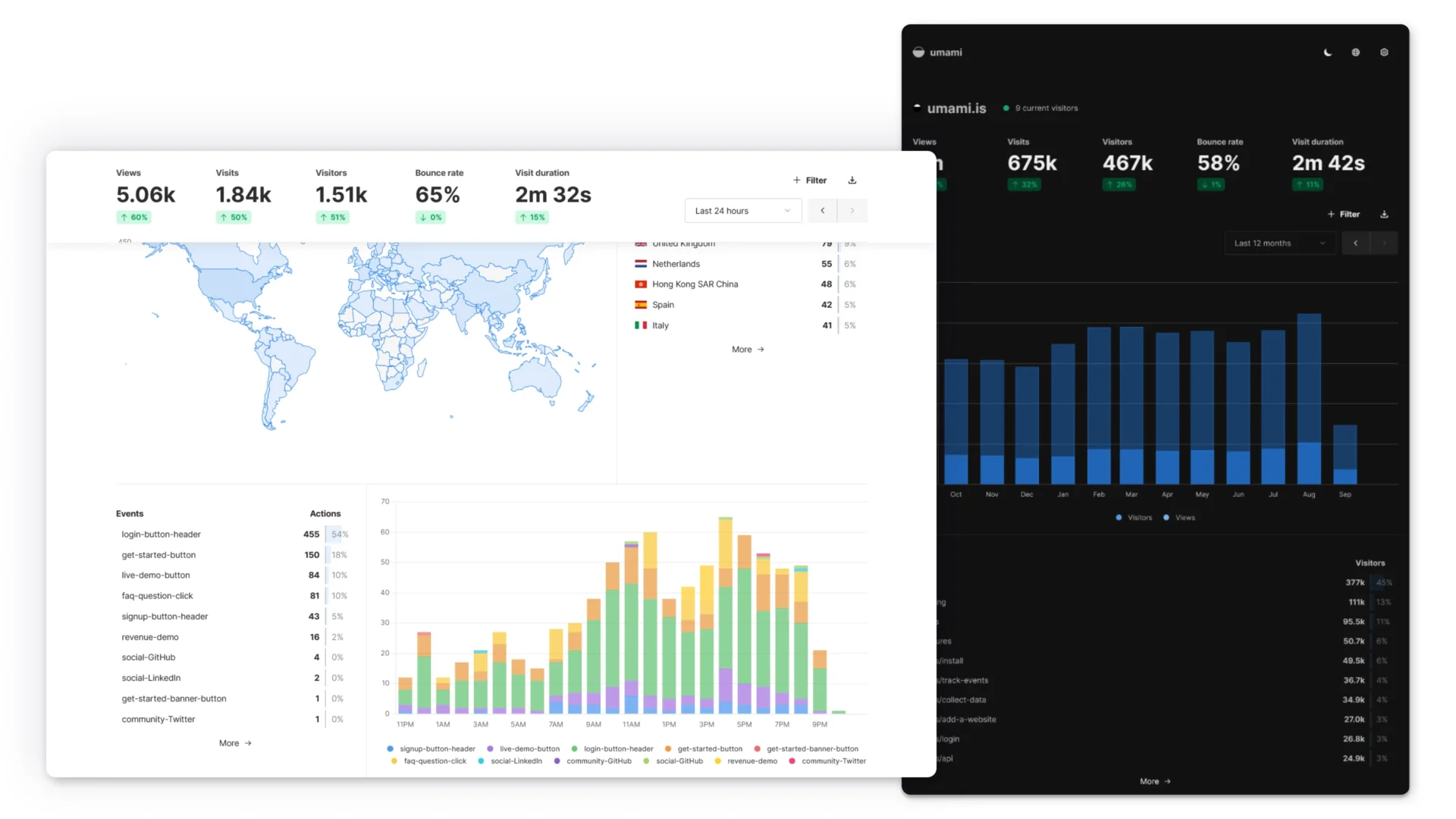
Matomo is one of the most popular GA alternatives chosen by companies worldwide. Its main distinction is maximum flexibility: Matomo can be deployed on your own server (self-hosted) or used in a cloud version. The service complies with GDPR, provides security control, and offers extended capabilities for e-commerce and custom solutions.
Matomo suits both online stores and corporate websites: it includes advanced reports on funnels, click maps, heatmaps, and user segmentation. This makes it more powerful than Plausible or Umami, but also more complex to administer.
| Characteristic | Description |
| Data model | Event-based and session-based model, supports hybrid scenarios |
| Cross-platform | Supports websites, e-commerce, and mobile applications |
| Integration | Plugins for CMS (WordPress, Drupal, Joomla), API for custom projects |
| Data storage | Self-hosted (full control) or cloud version with data storage in Europe |
| Cost | Free self-hosted version; cloud – from ~€22/month |
| Reporting | Advanced reports: sales funnels, heatmaps, segmentation |
| Speed | Updates close to real time |
| Privacy | Operates under European regulations |
Pros:
Cons:
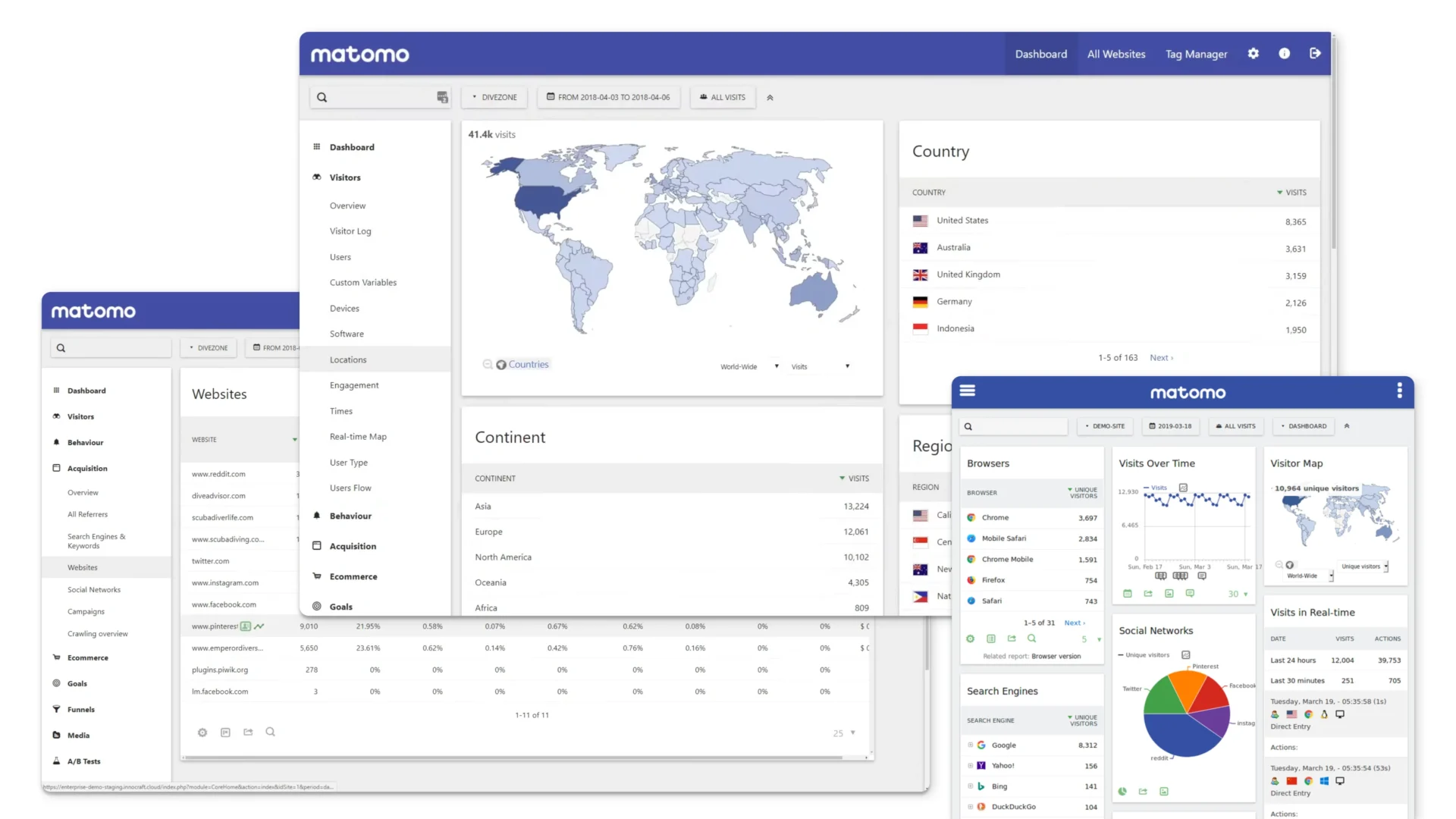
Ahrefs is a well-known tool for SEO analytics and backlink profile monitoring. Recently, the team introduced its own web analytics service, positioned as a GA alternative with a focus on privacy and usability. Ahrefs Analytics works without cookies and complies with GDPR requirements. The product is currently in active development, so its functionality is gradually expanding.
The main advantage of this tool is the combination of website performance analytics + Ahrefs SEO functionality. For businesses, this means being able to see traffic, sources, and conversion metrics alongside keyword rankings and site position data. This approach is especially useful for e-commerce and content-driven projects where SEO optimization is crucial.
| Characteristic | Description |
| Data model | Event-based model, focus on conversions and sources |
| Cross-platform | Websites and e-commerce projects |
| Integration | Connection via script, support for custom solutions |
| Data storage | On the owner’s server, data centers in Singapore |
| Cost | From $129/month as part of the global Ahrefs subscription |
| Reporting | Traffic metrics + SEO indicators (keywords, rankings, organic search) |
| Speed | Updates close to real time |
| Privacy | GDPR-compliant, no cookies |
Pros:
Cons:
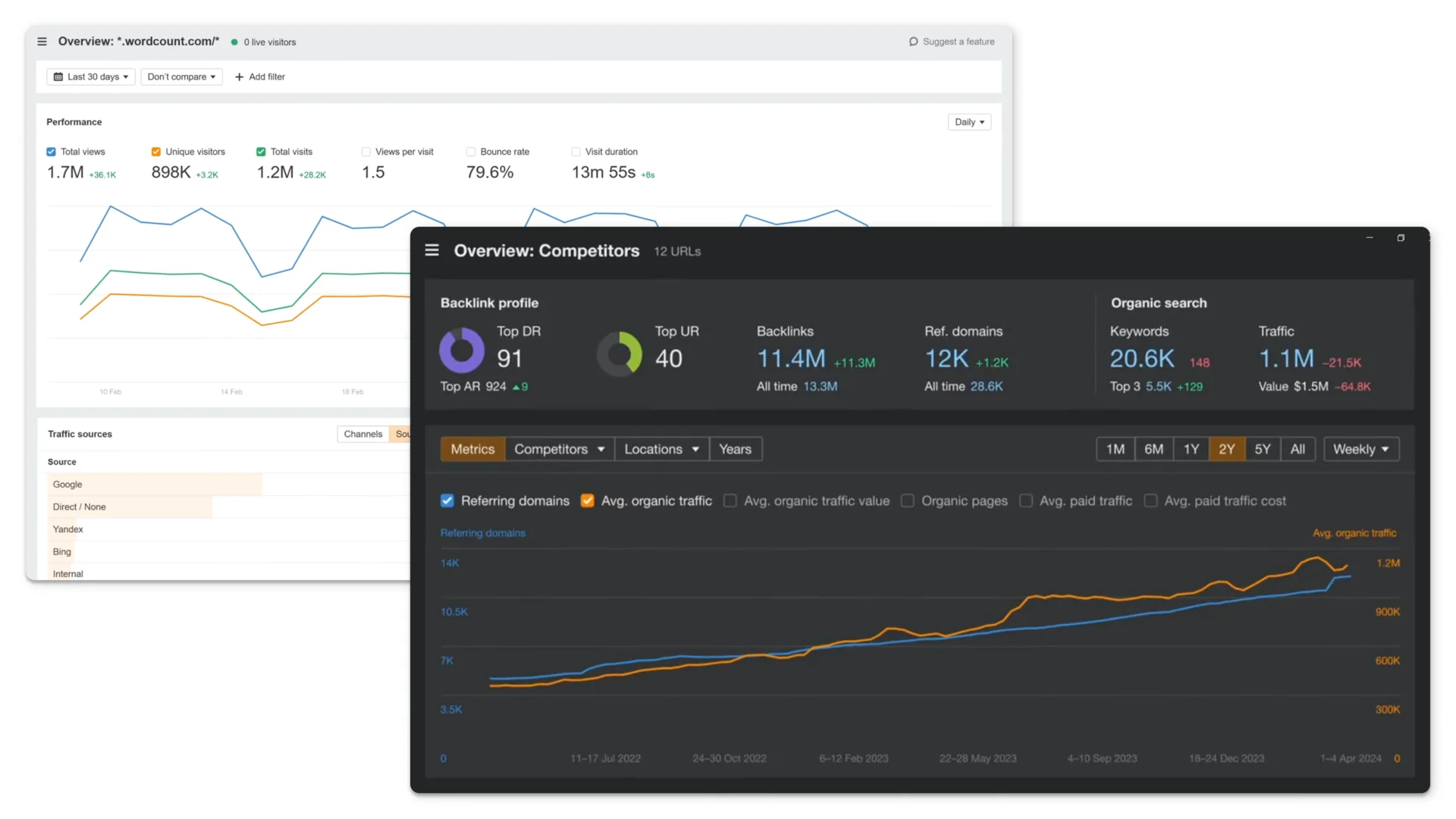
| Characteristic | Google Analytics (GA4) | Plausible Analytics | Umami Analytics | Matomo Analytics | Ahrefs Web Analytics |
| Core metrics | Sessions, events, users, conversions | Visits, sources, pages, events | Visits, pages, sources | Sessions, events, conversions, heatmaps, segmentation | Visits, conversions, SEO traffic |
| Price | Free; GA360 – Enterprise | Free self-hosted. Cloud from ~$9/month | Free (open-source) | Free self-hosted. Cloud from ~€19/month | Premium from $129/month (as part of Ahrefs subscription) |
| E-commerce functionality | Basic (standard funnel and order reports) | Basic (conversion tracking) | Limited (traffic and events) | Advanced (sales funnels, order reports, e-commerce plugins) | None |
| Data infrastructure | On Google servers (USA) | On provider’s servers (EU) or self-hosted | Only self-hosted (your server) | On provider’s servers (EU) or self-hosted | On provider’s servers (Singapore) |
| Security | GDPR concerns (USA) | GDPR-compliant system | GDPR compliance | GDPR compliance | GDPR compliance |
| SEO reports | Limited (via Search Console) | None | None | Additional plugins, SEO module integration | Built-in SEO metrics (keywords, rankings, organic) |
| Custom events and goals | Yes (complex setup) | Yes (flexible setup, but basic level) | Yes (basic events) | Yes (flexible, via plugins and API) | Yes (focused on traffic and SEO) |
| CRM/ERP integrations | Indirect via API | API, webhooks | API, minimal | Ready plugins + API | Currently limited capabilities |
| CMS and e-commerce support | Wide (WordPress, Shopify, etc.) | Simple integration with all CMS, custom via API | Basic support, custom via code | Plugins for WordPress, Drupal, Magento, API for custom frameworks | Script-based integration, limited list so far |
The choice of analytics system depends on the scale of the business and its priorities:
At Avada Media, we help companies implement analytics tailored to specific needs – from lightweight solutions for startups to enterprise-level integrations.
You can explore examples of our e-commerce projects and instantly calculate the cost of analytics implementation using our online calculator.
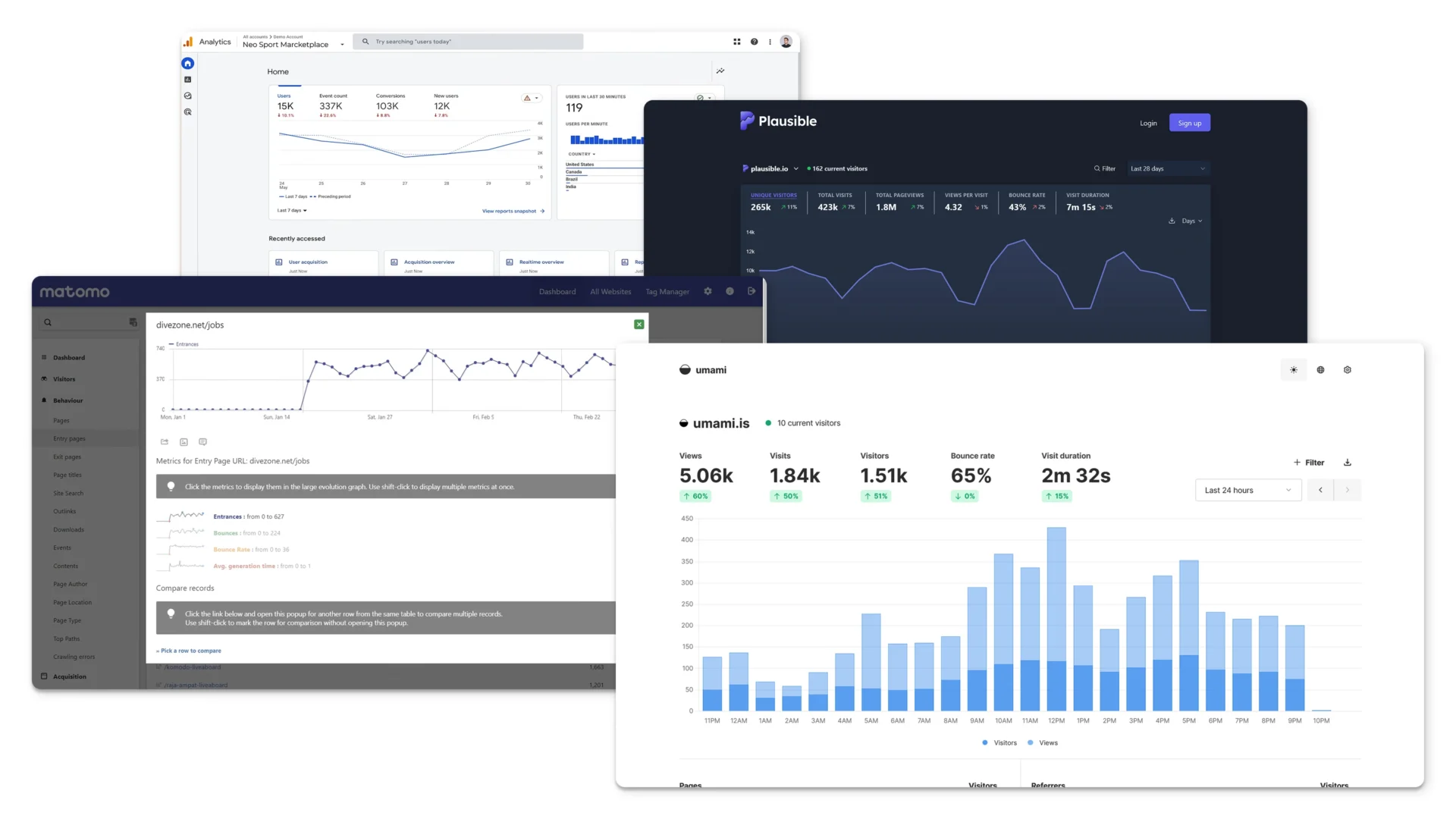
Can multiple analytics tools be combined?
Yes. Many companies use several tools simultaneously: for example, GA for marketing and Plausible/Matomo for GDPR compliance and easier visualization. This approach allows for different data perspectives and minimizes the risk of information loss.
What is best for a startup with a minimal budget?
Plausible (with its free Community Edition) or Umami (fully open-source) are the best choices. These solutions provide core metrics, easy integration, and allow you to start without extra expenses.
Which metrics are critical specifically for an online store?
Key ones: purchase conversion, order sources, average check, sales funnel, and customer returns. Reports on shopper behavior in the cart and during checkout are also useful.
How difficult is it to migrate from GA to alternatives?
Technically, migration is possible without major issues. Usually, it involves installing a new tracking code, setting up goals, and configuring integrations. However, historical reports from GA cannot be directly transferred, so often you have to start from a “clean slate.”
How to integrate analytics into a custom CRM/ERP?
When developing a custom CRM or ERP, we immediately include the possibility of integration with an analytics system. Connection is implemented via API or webhooks: events from the CRM/ERP are sent to the analytics platform and combined with website data. This creates a full picture of client interactions and allows tracking the entire cycle – from the first visit to a closed deal.
What is more cost-effective: paying for a subscription or maintaining your own infrastructure?
It depends on the company’s goals and resources. Cloud services (such as GA4 or Plausible Cloud) are more convenient for starting: they do not require administration, scale quickly, and update automatically. But as traffic grows, subscription costs can become higher.
Self-hosted solutions (Umami, Matomo CE, Plausible Community Edition) allow full control over statistics and independence from provider pricing. However, they require server resources and IT support. At Avada Media, we solve this challenge for clients by providing ready-made infrastructure on our servers so that businesses can use Plausible as self-hosted without extra maintenance concerns.
Contact the experts Have a question?
Developed by AVADA-MEDIA™
The user, filling out an application on the website https://avada-media.ua/ (hereinafter referred to as the Site), agrees to the terms of this Consent for the processing of personal data (hereinafter referred to as the Consent) in accordance with the Law of Ukraine “On the collection of personal data”. Acceptance of the offer of the Consent is the sending of an application from the Site or an order from the Operator by telephone of the Site.
The user gives his consent to the processing of his personal data with the following conditions:
1. This Consent is given to the processing of personal data both without and using automation tools.
2. Consent applies to the following information: name, phone, email.
3. Consent to the processing of personal data is given in order to provide the User with an answer to the application, further conclude and fulfill obligations under the contracts, provide customer support, inform about services that, in the opinion of the Operator, may be of interest to the User, conduct surveys and market research.
4. The User grants the Operator the right to carry out the following actions (operations) with personal data: collection, recording, systematization, accumulation, storage, clarification (updating, changing), use, depersonalization, blocking, deletion and destruction, transfer to third parties, with the consent of the subject of personal data and compliance with measures to protect personal data from unauthorized access.
5. Personal data is processed by the Operator until all necessary procedures are completed. Also, processing can be stopped at the request of the User by e-mail: info@avada-media.com.ua
6. The User confirms that by giving Consent, he acts freely, by his will and in his interest.
7. This Consent is valid indefinitely until the termination of the processing of personal data for the reasons specified in clause 5 of this document.
Send CV
Contact us in any convenient way for you:
+ 38 (097) 036 29 32